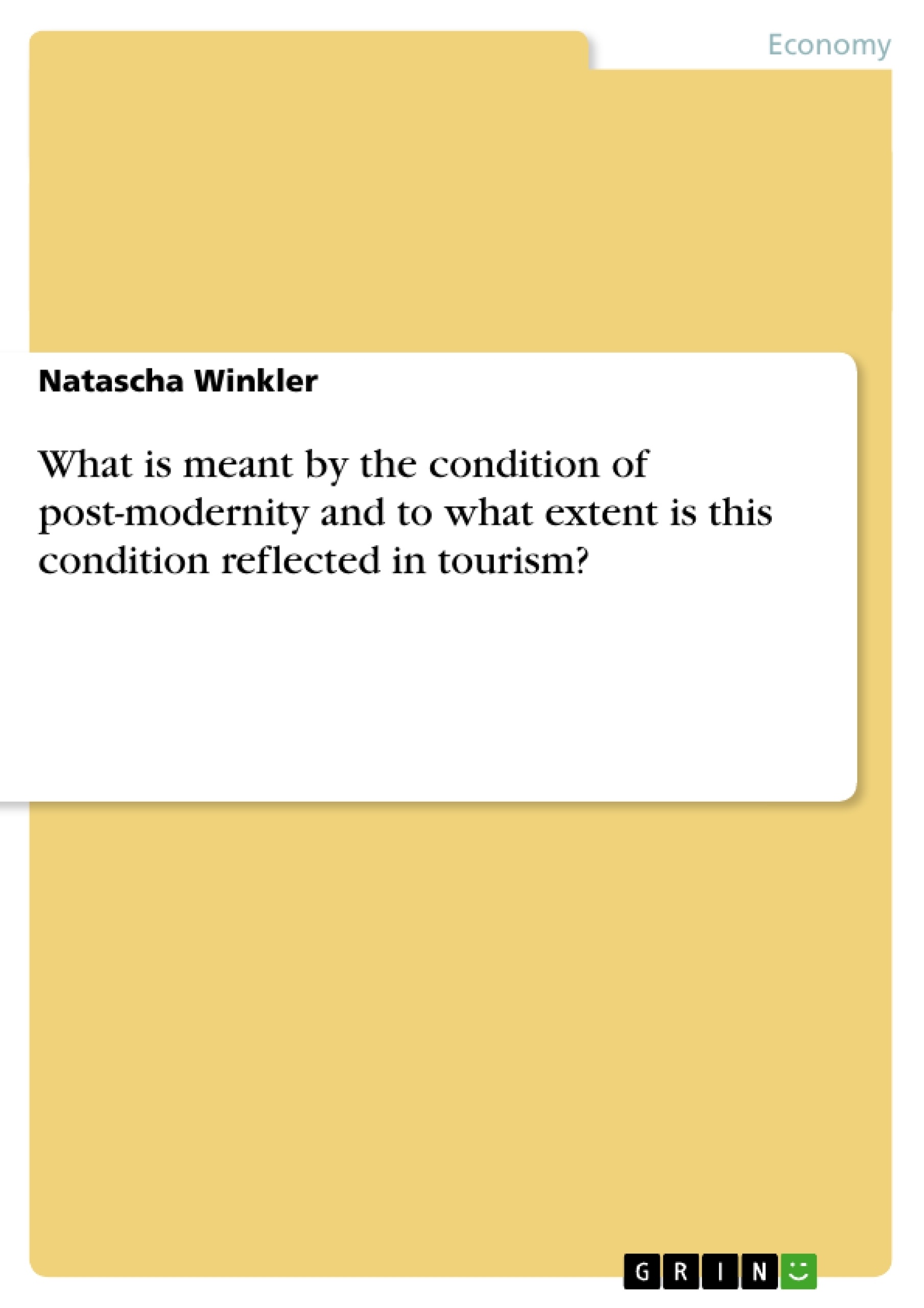Excerpt
(a) What is meant by the ‘condition of post-modernity’?
(b) To what extent is this condition reflected in tourism?
This essay investigates the meaning of the condition of post-modernity today and how it is reflected in tourism.
Post-modernity is a term that is difficult to clarify and often there are different statements amongst sociologists whether at all this term exists or not (Urry, 2002; Atkinson, 2002; Sharpley, 1994; Williams and Sewpaul, 2004). In general the advocates of Post-modernity say that it can be seen in many different conditions as e.g. in art, literature, architecture and the social condition of society. As the term appears in almost all aspects of science and areas of life, just the main characteristics and its connection with tourism will be outlined in this work.
The term post-modernity suggests that there must have been a break of an earlier epoch and therefore a new era must have begun afterwards.
The sociologists do not agree with each other when the condition of post-modernity really began. Lyotard (1984) believes in contrast to many others that this change of society and culture is in progress at least since the 1950ies, whereas Harvey (1989) says he found evidence for a shift of cultural change in newspapers and journals in the 1970ies.
However, to understand what kind of changes have taken place in the last decades the author will first outline the main characteristics of modernity.
The development of modernity started in the sixteenth and seventeenth centuries when society made an enormous progress in agriculture, science and industry. The term modernity as a social condition was not implemented back then. However, due to this progress and therefore a rise in knowledge, society believed in science and was looking forward to the future. These so called Enlightenment thinkers foresaw the victory of scientific development and knowledge. Society started to abandon everything that was linked to traditions and the past. The society of mass production and mass consumption had emerged.
During the time of modernity society also separated themselves from others by class, gender, race, occupation and wealth, a society of differentiation emerged (Sharpley, 1994). There have been high distinctions between high culture, people who where wealthy and therefore had access to cultural events and knowledge, and the low culture, which have been ordinary, working people.
To get a short insight of what modernism was like it may now be easier to understand what is meant with the condition of post modernity.
Changes have taken place in the last decades, which can not be denied, and most sociologists agree about it. As Rousenau (1992) says Post-modernists found fault with everything modernity has produced. This means de facto that all the achievements people made during modern times, e.g. advanced technology, nation state, life in fast lane, career etc, are being questioned by the post-modernists (Rousenau, 1992).
Postmodernists believe that there can never be anything really new (Rousenau, 1992), and therefore look back to the past, history and old traditions. Society tries to conserve the past whether it is in music, style, recreation or other things (Sharpley, 1994).
In architecture there are probably the most obvious changes recognisable. In modern times people built houses which were functional, today postmodernists emphasize the aesthetic over the pragmatic and therefore houses often look like something rebuilt from the past, e.g. Victorian houses. These changes can not only be seen in the environment but also in the culture of society and the things they consume. The past and the present intertwine and there is no real focus anymore on the future. To live in the ‘condition of post modernity’ also means, to live in a time of de-differentiation (Sharpley, 1994). Postmodernists do not have an adverse view of things; they question all the different worldviews and rather think about it than taking them as a matter of course. It is a view of uncertainties (Rousenau, 1992) as they reject fixed notions of reality, knowledge and moral (Atkinson, 2002). Due to this world view they refuse to accept boundaries or hierarchies in ways of thinking. They are aware that society and life is full of complexity and that there is a lack of clarity and multiplicity. Postmodernists also refuse to commit any particular standpoint to politics (Rousenau, 1992).
As Jameson (1984) points out, one important sign of living in post-modern times is that the distinction between high and low culture has almost vanished and new kinds of culture have been emerged. These do not follow the laws of capitalism anymore, different institutions have arisen which people choose to follow. An example for this would be that people today depend on a physical culture. The way somebody is dressed or looks like became very important in contemporary society as people often get judged about it. Coupland and Coupland (1997) argue that there is no certainty anymore people gave their body a “remarkable symbolic status, to the extent that, for some, it is the single most potent signifier of selfhood” (p.18).
[...]
- Quote paper
- Natascha Winkler (Author), 2007, What is meant by the condition of post-modernity and to what extent is this condition reflected in tourism?, Munich, GRIN Verlag, https://www.grin.com/document/68299
Publish now - it's free






















Comments